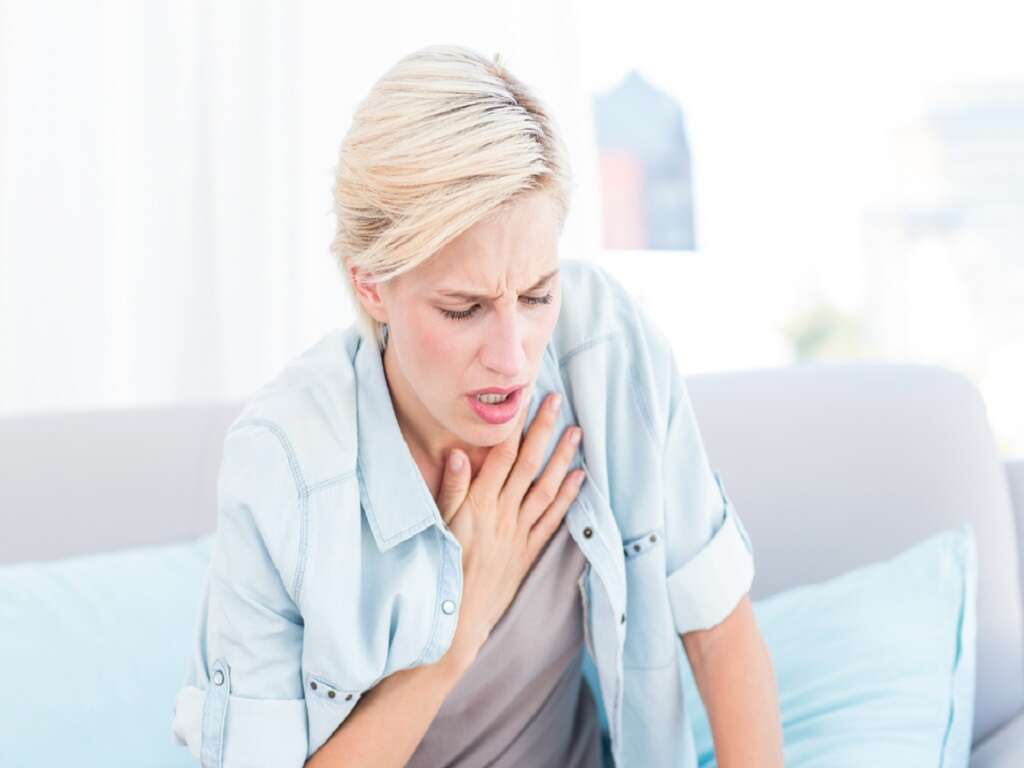10 Symptoms of Angina
The proper functioning of all our organs are important to our continued health, but problems with some organs can be considerably more alarming than problems with others. Develop complications in the liver or kidneys, for example, and you should be able to seek treatment over time. However, when it comes to complications with the heart, there is usually no time to spare whatsoever.
Although some symptoms can be very concerning indeed, they are not always an indicator that we are in immediate danger. Angina is caused by a reduction in the flow of blood to the heart and, although symptoms are very similar to those of a heart attack, there is not always the same risk 1http://www.heart.org/HEARTORG/Conditions/HeartAttack/DiagnosingaHeartAttack/Angina-Chest-Pain_UCM_450308_Article.jsp. Regardless, any problem with the heart is something that should be taken seriously.
Symptom #1: Chest Pain
Pain in the chest area is usually something that is not to be taken lightly. With so many organs and vital blood vessels in the area, chest pain could be letting you know that there is something seriously wrong. Chest pains aren’t always caused by something to be overly concerned by, however, even if they can sometimes be very alarming.
Angina is caused by a reduction in the flow of blood to the heart. While it is often mistaken for a heart attack, it doesn’t always represent a serious risk to your life. The angina-related pain is often described as pressure against the chest wall and it can cause the patient to have problems breathing. Usually, the onset is not as abrupt in comparison with acute myocardial infarction, and it should not be as painful either. Regardless, angina or other unexplained chest pains can still be dangerous and should be taken seriously.
Symptom #2: Jaw Pain
All parts of our body are connected in one way or another. Nerves and blood vessels are interlaced throughout the body, and a complication in one part of the body can cause symptoms to be felt somewhere else. This is true with angina, as one symptom is a pain in the jaw area.
If jaw pain does occur at the same time as chest pains, then it may be that angina is the cause. Jaw pain and chest pain are also symptoms of a heart attack, though, so it is something that you should take very seriously. If you are experiencing these symptoms without explanation, then you should waste no time in seeking emergency medical assistance.

Symptom #3: Lightheaded
It’s not uncommon for us to feel lightheaded occasionally. Sometimes it may be the result of standing up too quickly, or maybe we have not eaten, or we have been standing for too long. Sometimes, though, it can be a sign that all is not right and that you really should go see a doctor.
Feeling lightheaded and dizzy is one symptom of angina. While it is not necessarily dangerous in and of itself, it could be very risky if you are operating heavy machinery or driving. Additionally, other causes for such dizziness can be very serious, so it is something that should be taken seriously.
Symptom #4: Chest Tightening
In addition to a sensation of chest pain, angina can also cause a sensation of tightening of the chest. This can be very alarming and could cause the patient to panic. Chest tightening is also a symptom of a heart attack, so it is understandable that the symptom can be very frightening.
When caused by angina, this tightening of the chest is usually very short-lived. It will often subside faster when the patient tries to compose themselves and relax as much as possible. If the chest tightening does not subside quickly then you should seek emergency medical assistance immediately.

Symptom #5: Excess Sweating
While it may be awkward for us at times, sweating provides an excellent evolutionary advantage as it helps us regulate our body temperature. Sweating can also aid in expelling toxins from the body, which means excess sweating could be a signal that all is not right.
Excess sweating is a common symptom of angina as the person is likely to be under considerable stress at the time of the pain and chest tightness. Excess sweating is also a symptom of a heart attack, though, so when combined with other symptoms such as chest pain, it should be taken very seriously. If you are unsure, seek medical help straight away.
Symptom #6: Shortness of Breath
The heart helps to circulate oxygen around the body. When this circulation is affected, parts of the body will be short of oxygen and will try to compensate. Angina causes a decrease in oxygen being fed to the heart. This causes us to feel as though we are short of breath.
Angina’s restriction of blood flow to the heart is often temporary and flow can be restored eventually. When experiencing shortness of breath, it is important to keep calm and try to ensure you are breathing properly. However, sustained shortness of breath is also a symptom of a heart attack and is something that should not be taken lightly.

Symptom #7: Worsening Symptoms Upon Exertion
Many events can increase the oxygen demand of the heart. If this happens alongside a decreased blood supply, angina symptoms can be triggered or aggravated.
Exercise, eating, emotional stress and even sudden exposure to cold can cause an episode of angina. If you are suffering from these symptoms, you should seek medical attention for proper diagnosis.
Symptom #8: Nausea
When we undergo physical or emotional stress, it is not uncommon for us to feel as though we wish to vomit. Nausea is often a result of the body being under considerable trauma, although it can also often be a result of milder causes. Considering that a problem with the heart can be a very considerable trauma indeed, it should come as no surprise that nausea will not be far away.
Many people suffering from angina complain of nausea during an attack. Some medicines can help to relieve nausea, and it is likely to subside once the person relaxes and the blood flow has returned to normal levels.

Symptom #9: Increased Heart Rate
Whenever something is wrong, our bodies will spring into action to try and deal with the problem straight away. This will often involve an increase in adrenaline to speed up the rate at which the heart pumps blood around the body to get nutrients where they are needed. However, an increased heart rate is also a symptom of angina.
With angina, the increased heart rate can be worsened by panicking at the symptoms. It is best to try and keep as calm as possible to steady the heart rate.
Symptom #10: Anxiety
It is never pleasant to be ill or face a complication with our bodies. We can feel unwell, experience pain and, sometimes, we can be outright terrified in response to the symptoms. Depending on the nature of the symptoms involved, certain conditions may have some people experiencing anxiety or fearing for their lives.
Feeling anxious is a normal response against pain and especially if the discomfort is located in the chest. Anxiety can exacerbate the symptoms and cause many others to appear. Therefore, it is important for patients suffering from recurrent episodes of angina to stay calm. Whenever in doubt of the cause of a patient’s anxiety, medical attention is recommended.










